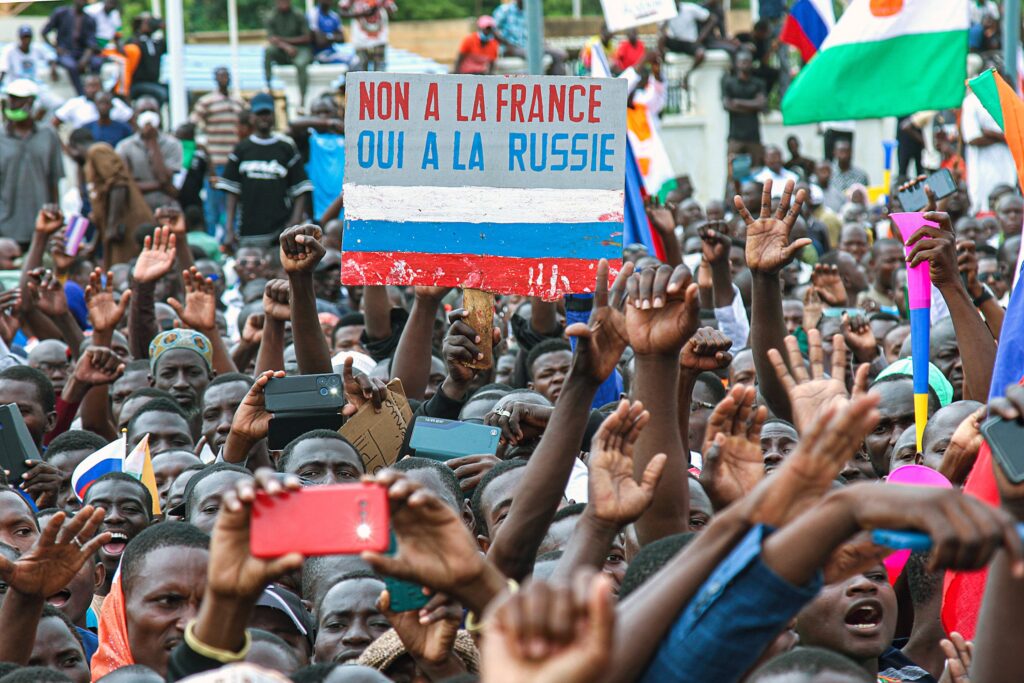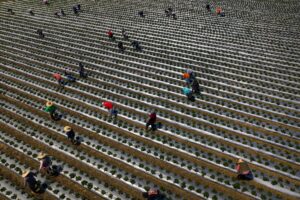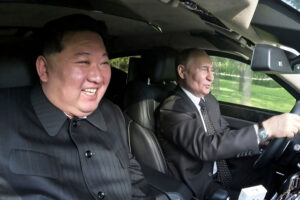Whither Ecowas? Whither Africa?

“You can say about pretty much all of Africa, they’re incapable of governing themselves and benefitting their citizens because the governments there are all about looting and pillaging and lining their pocket and going shopping in Paris.” Thus said Erik Prince, founder of Blackwater, the private U.S. security firm, calling for the recolonization of the continent. He is perfectly right about the bad governance bit. One has only to look at the pitiful state of oil-rich Nigeria, where an estimated US$582 billion has been looted since what passes for independence in 1960, while an estimated 70 percent of its 220 million people live in extreme poverty, many without running water and electricity. As for whether the continent should be recolonized, one might ask whether it was ever decolonized in the first place, a point forcibly made by Capt. Ibrahim Traoré, the charismatic 35-year-old military ruler of Burkina Faso. At the second Russia-Africa Summit last July, he admonished the continent’s leaders for “behaving like puppets who dance every time the imperialists pull the strings,” and likened the continuing stranglehold of the former French imperial power to slavery:
“For more than eight years we’ve been confronted with the most barbaric, the most violent form of imperialist neocolonialism. Slavery continues to impose itself on us. Our predecessors taught us one thing: a slave who cannot assume his own revolt does not deserve to be pitied. We do not feel sorry for ourselves, we do not ask anyone to feel sorry for us. The people of Burkina Faso have decided to fight, to fight against terrorism, in order to relaunch their development.”
He was particularly incensed when the 15-member Economic Community of West African States (ECOWAS) kicked out Niger and imposed sanctions against it in August last year, as the group had previously done with Burkina Faso and Mali. The three nations constitute the landlocked states of the Sahel now under military rule. But the Niger sanctions seemed particularly vicious given that Article 68 of the 1993 revised ECOWAS treaty takes into consideration “the economic and social difficulties that may arise in certain Member States, particularly island and land-locked States.” The most egregious result was to cut off the 85 percent of power that Nigeria supplies its northern neighbor in return for its historical decision not to dam the Niger River (though Niger nevertheless pays for this power at commercial rates). The other was to close the 1,800 km-long border, depriving Niger access to the port of Lagos that accounts for 80 percent of the goods entering the subregion, along with the market which constitutes half the ECOWAS population and 60 percent of its GDP. According to USAID, Nigeria is “critical for Niger to stabilize prices and supplies,” being “the primary consumer and source of demand for livestock.” As Traoré fumed: “Thousands of Nigériens died on their hospital beds because of a lack of electricity or lack of medicine. It is a crime! They are responsible for these sanctions; they are responsible for these deaths.”
According to Bolá Ahmed Tinubú, Nigeria’s new president—and, coincidentally, the new ECOWAS chair—the point about the sanctions was to reaffirm “our relentless commitment to democracy, human rights, and the well-being of the people of Niger,” in keeping with the 2001 good governance protocol, although for Traoré and his fellow Sahelian rulers, he is hardly qualified to lecture anybody on what Fela Kuti, the late Afrobeat musician, called ‘Demo-crazy/Crazy Demo’ that pass for elections in the subregion. Tinubú himself was caught urging his people to “Grab it! Snatch it! And run with it!” at a meeting in London four months ahead of voting. In the ensuing election itself, the results of the national assembly were uploaded in real time—but not those of the concurrent presidential election, due to a “glitch” we had been previously assured would not happen, amid rumors that the head of the electoral commission had been bribed. Even the usually complaisant European Union called the exercise “not credible.” The United States called it “deeply troubling,” but then the latter knew who they were dealing with because it was in their country that the same man was indicted in 1993 on charges of drug smuggling and money laundering, for which he forfeited US$460,000.
Another tainted “democrat” is Alassane Ouattara of Côte d’Ivoire, a former deputy managing director at the International Monetary Fund who was quick to pledge a battalion of 850 to 1,100 troops in a “show of force” to bring the Nigerien junta “to the dialogue table” (and who had previously been quick to cut off Mali’s power supply following that country’s military coup). This was the same Ouattara who originally assumed power in 2010 but argued that a series of constitutional amendments passed in 2016 had “reset his term count to zero,” thereby making him eligible to stand for two additional five-year terms. This is the man who had previously claimed that an “African renaissance is unfolding before our eyes … Most countries, through most of their years of independence, have been ruled by autocratic leaders—autocratic because, whether enlightened or not, they stood above the law.” Such brazen manipulation of the constitution—let us call it a coup—was overlooked by the French president, Emmanuel Macron, because “France does not have to give lessons” when asked why his case should be considered different from that of President Alpha Condé of Guinea-Conakry, whom Macron accused of having “organized a referendum and a change in the constitution just to keep himself in power” and the reason why “I haven’t yet sent him a congratulatory letter.”
One doesn’t have to dig deep to fathom such double standards. Macron needs his “boy” in place to perform his own sleight of hand, which is to guarantee the continued use of the West African CFA franc that was imposed on the colonies as a condition of their “independence”—“We grant independence on the condition that the independent state endeavors to respect the cooperation agreements… The one does not go without the other,” French premier Michel Debré wrote to his Gabonese counterpart Léon Mba—that the Sahel triumvirate are currently planning to ditch. This ensured “a fixed exchange rate with the French franc (subsequently the euro); a French guarantee of its unlimited convertibility; a requirement to deposit 50 per cent of the respective country’s foreign exchange reserves in a special French Treasury ‘operating account’; and the principle of free capital transfer within the franc zone,” as I wrote in another context. In effect, this enabled France to pay for imports from those places in its own currency, in the process saving on foreign currency. Additionally, French companies were “guaranteed freedom to repatriate their revenue and capitals without any foreign exchange risk,” given that France decided the zone’s exchange and monetary policy. The French economy, as a whole, benefitted from a trade surplus which provided it with a “far from negligible amounts of exchange reserves which have sometimes been used to pay for France’s debts,” according the economist Ndongo Samba Sylla. For African leaders specifically, the arrangement has proved “a mechanism to facilitate the transfer of financial resources, no matter how they were acquired.” If necessary, they were also guaranteed “the backing of the French government against political dissidents and their own people in times of trouble.”
Ouattara has long been a staunch defender of the CFA franc, once even mysteriously claiming that the matter of its status was best left to the experts (of whom he was presumably one). But its persistence has long been seen as a humiliation by activists and intellectuals who want independence to mean just that. Sékou Tourè of Guinea-Conakry was the only leader to opt out of the arrangement on the grounds that “we prefer poverty in liberty than riches in slavery.” He was duly punished for his temerity; departing French civil servants destroyed everything in their wake, and the secret service flooded the country with fake banknotes. Macron himself, who prides himself as the first post-colonial French president, has insisted that the CFA franc was a “non-issue” but then did an about-face in December 2019, when he and Ouattara appeared in Abidjan, Côte d’Ivoire’s commercial capital, to announce that it would be replaced by a new currency called the Eco. And yet the “Eco” had been floated as the name of a proposed common currency for ECOWAS itself at a meeting in Abuja, the Nigerian capital, as envisaged in the original ECOWAS treaty, just months earlier;hence the very name of the organization. Muhammadu Buhari, the then Nigerian president, expressed his “uneasy feeling” at being frozen out of their deliberations: “It’s a matter of concern that a people with whom we wish to go into a union are taking major steps without trusting us for discussion,”he said.
And now Traoré, along with Col. Assimi Goita of Mali and Gen. Abdourahamane Tchiani of Niger, have not only announced their intention to do away with the CFA franc and establish their own currency but also signaled their intention to leave ECOWAS. They instead signed the Liptako-Gourma Charter, establishing their own tripartite “Alliance of Sahel States,”with the agreement that “any attack on the sovereignty and territorial integrity of one or more contracted parties will be considered an act of aggression against the other parties.” ECOWAS itself has pointed out that the revised treaty requires them to give one year’s notice before they cease to be a member. But for Traoré this is just so much pedantry: “It’s not out of the blue to turn your back on an organization, but the result of a thorough analysis. If it were a fit of anger, we would have done it a long time ago. We took time to analyze the situation, weigh a lot of things and finally make a decision,” His main grouse was ECOWAS’s failure to help curb the Islamic insurgencies plaguing all three countries despite the provisions of the community’s charter itself: “For more than a decade, Mali and Niger have been at war with terrorism. And in Burkina Faso, we’ve been at war for almost a decade. We have never received any aid from this organization.”
They have instead turned to Russia and, to a lesser extent, China, which is giving the United States cause for concern, especially since all three also ordered France to close the military bases it had been operating in the subregion since 2013 (while failing to make any inroads into the insurgency). Macron tried at first to resist the move by claiming that France was only in the Sahel “because there is a terrorist threat and sovereign states asked us to help.” But when his hand was finally forced, he proceeded to sneer at the “baroque alliance between self-proclaimed pan-Africans” and Russian and Chinese “neo-imperialists,” both of whom were stirring up old arguments over sovereignty and colonial exploitation for their own ends.
“We feel like family,” Traoré said at last July’s second Russia-Africa Summit, because both countries “share the same history in the sense that we are the forgotten peoples of the world.” Waxing lyrical, he said they were here “to talk about the future of our peoples, about what is going to happen tomorrow, about this free world to which we aspire, this world without interference in our internal affairs.” The people of Ukraine might have something to say about non-interference in other people’s internal affairs and herein lies the problem. There is no doubt that Traoré is especially popular among his people, as indeed are the other two. Everybody witnessed the spontaneous eruption of public protests in Niamey, Niger’s capital, when Macron attempted to defy Tchiani’s order to close down the military bases, and any educated Nigerien knows perfectly well that France’s main concern is the huge uranium deposits mined almost exclusively by Orano, a French-owned company, for which it pays an eighth of the world price. But the adulation accorded Traoré is palpable, and with good reason. He is widely considered the rightful successor to the equally charismatic and youthful Thomas Sankara, the one who changed the country’s name from Upper Volta to Burkina Faso (Land of the Upright People) and who many believe was assassinated on the orders of then President Mitterrand. Many fear the same fate may befall Traoré, having apparently survived three such attempts already. He has done much in his relatively short time in power to show his orientation.
It isn’t only that he has called out France’s policies towards its colonies. “We are not the enemies of the French people, it’s the policies of those governing France which is the problem in Africa”, Traoré says. But he has actually impacted the lives of ordinary Burkinabes. Among the most far-reaching policies are the 85 “autonomous water points” that provide clean drinking water nationwide, combating waterborne diseases; a newly built gold refining factory to maximize the price of the country’s raw material, which it otherwise exported cheaply; and a modernized road network. He has also streamlined the previously sluggish and bloated bureaucracy to ensure that projects are completed on time and at cost. All these are to the good and “the people” are clearly behind him, just as they appear to be behind his other two, lesser-known compatriots. Niger’s Gen. Tchiani, in particular, who has hardly had much time to make a mark, seems to have derived at least part of his popularity by simply standing up to France in a manner already championed by Traoré, in whose shadow he and Mali’s Col. Goita have been able to hide. Many believe that as former head of the presidential guard Tchiani feared that he was about to be ousted.
Given all this, it is hardly surprising that ECOWAS was forced into a U-turn by suddenly lifting sanctions against all three countries at a meeting less than a week ago chaired, ironically, by Yakubu Gowon, the former Nigerian military head of state under whose rule ECOWAS was established. Here in Nigeria, we know all about military rule, which ended a quarter-century ago and is now being touted again in light of the catastrophic failure of the civilian regimes which have only continued the downward spiral even as the population has doubled. At the same time, no one is anxious to see how either Russia or China are to be preferred to the old colonial powers. All are outsiders interested only in the continent’s wealth. Why should we think otherwise? They, too, have their problems which we can help solve by, for instance, purchasing their military hardware, the better to kill each other. One understands the despair when faced with the old men—Tinubú is 84 (although he claims to be a decade younger) and Ouattara is 82—who are assuredly not democrats and seem intent only on leading us to the grave, as Mo Ibrahim once quipped when pondering the phenomenon of the 90-year-old Robert Mugabe of Zimbabwe seeking to stand again. We are the youngest continent—18 years is the mean age for ECOWAS—with the oldest rulers.
Africa’s long history of slavery and colonialism continues to be reflected in the world’s dealings with us. “While we are invited to those summits, we are given limited time, then aligned, all over 50 of us, and unfortunately that’s the only thing we go back with,” in the words of Kenyan president, William Ruto, speaking to a state of affairs that has done untold damage to the African psyche. We are only now, and slowly, coming to terms with this, so much so that Ruto himself subsequently put himself through it all over again in Italy. That we have been bundled into arbitrary countries named by the colonialists—ECOWAS occupies an area half that of the United States—hardly helps. Indeed, it was because of the very arbitrariness of those boundaries, across which the inhabitants freely traversed with their cattle and their skills, that ECOWAS was founded in the first place. I believe that our brothers and sisters in the Sahel will not leave us because they have nowhere else to go. ECOWAS must become ever closer to realizing the vision of the original treaty. So, too, must the continent itself, which is our only salvation in the world we inhabit. And we aren’t even as populous as China or India. But there is nothing new in this. Kwame Nkrumah said it in 1956, as he celebrated the independence of the Gold Coast he renamed Ghana: “Our independence is meaningless unless it is linked up with the total liberation of Africa.”


